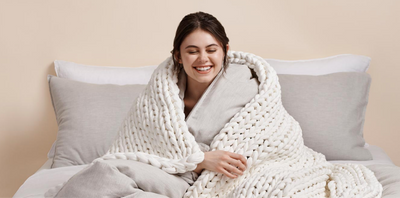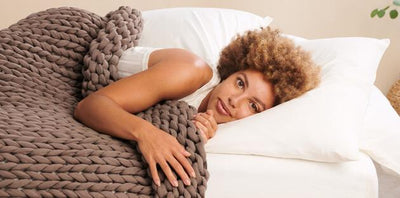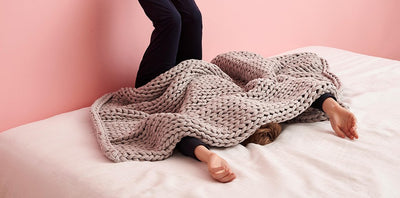11 Possible Explanations For Why You Get Hot When You Sleep
You may get hot when you sleep for environmental reasons like room temperature or bedding type, but medical issues like menopause, sleep apnea, or anxiety disorders could also be at play. Finally, lifestyle choices like exercising before bed and alcohol consumption are another potential factor.

Bearassentials
A hot room or stuffy bedding are two of the most common reasons for night sweats.
Lifestyle factors like obesity and consumption of substances like alcohol or caffeine can also lead to higher temperatures.
There are also several physical and mental health conditions that can lead to thermoregulation problems
Did you know?
Our bodies have evolved to start cooling before bedtime in line with our circadian rhythm. Why we evolved this way is still a mystery, but one theory suggests that it’s to conserve energy.
The human body naturally cools down during sleep, so if you’re getting hot during the night, there’s a good chance you’re losing out on a few winks. And the reasons for overheating are often complex. Here are 11 possible explanations for why you get hot when you sleep.
1. Room Temperature
One of the most common reasons for overheating at night is also one of the simplest – your bedroom is too hot or humid. This is increasingly becoming a problem each year as global temperatures continue to rise and hit new records.
The ideal temperature for a cozy sleep is from 15-19 degrees Celsius (59-66 F). Why so cold? Well, human bodies naturally go through a core temperature drop during sleep that helps us maintain that dreamy state. Keeping your room cool, but not necessarily frigid, may be one of the keys to a better sleep that you’re missing.
2. Bedding and Bed Wear
Another great way to prevent your body from doing its cooling thing is by bundling up in layer upon layer of stuffy material. This includes pajamas, blankets, and even certain pillow materials.
Here are a few of the fabrics and stuffing types that can lead to overheating:
- Velvet
- Wool
- Down feathers (in comforters or pillows)
- Memory foam
- Plastics found in pillows, bedding, and some weighted blankets
If you’re trying to keep cool, consider more breathable options. For example, our Tree Napper weighted blanket is made entirely of cooling Tencel and is designed with an airy knitted pattern that allows for airflow.
Of course, if your bedding and pajamas are too thick, it won’t matter what material they’re made of. Step one might be to search for thinner and looser layers to keep you cool when you sleep.
3. Menopause
Sometimes the best bedding and the iciest room won’t make a difference. There are countless conditions that could account for that, but if you’re a woman in mid-life, menopause or perimenopause might be the most likely.
Diagnosed 12 months after the last menstrual cycle, menopause often affects women after the age of 40, however it can come sooner or much later. And one of the most common symptoms associated with the condition is hot flashes. They can come suddenly at any time of day or night and are often accompanied by uncomfortable sweat.
Hormone imbalance is one of the root causes of these hot flashes as the body gradually shifts away from estrogen production. Fortunately there are several natural ways to treat menopause symptoms.

4. Obesity
Another way to light the fire at night and keep it burning while you sleep is by being overweight. Combine it with menopause and hot flash symptoms can get even worse
But you don’t need to be a menopausal woman for obesity to cause you to get hot when you sleep. A 2018 study looked at the effects of higher BMI (body mass index) ratings and found that those who were heavier had a harder time regulating their body’s temperature.
A separate study from 2014 concluded the same thing, saying, “It could be concluded that the mean body surface temperature is dependent on body fat.”
Because of that, exercise and proper nutrition could help keep you cool at night.
5. Sleep Apnea
Strongly related to obesity is the sleep disorder, sleep apnea. It’s a condition that can cause patients to stop breathing during the night due to soft tissues in the pallet blocking the airway.
According to the American Heart Association, around 70% of sleep apnea patients are obese, but even patients at a lower BMI may get too hot when they sleep.
A study completed in Iceland in 2013 found that 33% of the 800 monitored obstructive sleep apnea patients had night sweats three times a week or more. Fortunately, that study also found that CPAP machines helped bring that number down to 11.5%.
6. Infections
Ever had a cold, flu, or other viral infection that left you kicking the blankets off in the middle of the night? You’re in good company, because the body raises its temperature by design when fighting an illness.
Night sweats are a common symptom of infections, whatever the cause. Even if you don’t have many other concerning symptoms, getting too hot at night could be a sign that your body is fighting something off.
If it started recently and out of nowhere – and you’ve ruled out everything else on this list – you may want to give it a few more nights and consider seeing a doctor if it doesn’t stop.

7. Other Physical Health Issues
The list of health-related sources of night sweats could go on and on. Here are a few potential medical sources for concern when it comes to overheating at night:
- Hormone disorders like hyperthyroidism and diabetes that interfere with the endocrine system.
- Cancer treatments like removal of testes in men and removal of ovaries in women.
- Autoimmune disorders like celiac disease and rheumatoid arthritis.
These conditions can all force the body to behave differently from normal. In the case of autoimmune disorders, they may convince the body that there’s a problem requiring higher temperatures when you’re otherwise healthy.
Your hormone levels may also be irregular because of other conditions, leading to similar effects that can explain why you get so hot when you sleep
8. Mental Health Conditions and Disorders
Even if you don’t have a single problem from the neck down, you can still experience hot flashes. The mind is a powerful thing, after all.
Recent research has found that those with certain mental health conditions may be at a greater risk of getting too hot when they sleep – or even while awake – because of their medication. In particular, antidepressants and antipsychotics can negatively affect the body’s ability to regulate temperature.
Heightened cortisol levels often associated with stress and anxiety disorders can also lead to high fevers during elevated states. Chronic stress is associated with low-grade fever symptoms, too.
If you’re someone dealing with a mental health disorder, it’s worth keeping in mind
9. Exercise Around Bedtime
Not all stress is involuntary. Some people like to put their bodies through it via exercise. And whether that’s a walk in the park or a hike up Mount Kilimanjaro, if you’ve exercised too close to bedtime, it could be another explanation for why you get so hot in bed.
It’s no secret that working out raises the body’s temperature as much as a full degree or more depending on the exercise. This temperature increase usually hits a peak after about 30 minutes of exercise.
But what’s less well-known is that this increase in heat lasts for a while after the workout is over. However, it normally only takes a half-hour or so to cool down. As long as you’re not trying to hit the sack immediately after sprinting up a hill, you can probably rule this one out.
10. Alcohol Consumption
Are you someone who likes a little night cap? A cocktail to tuck you into bed? If so, that might be why you get so hot when you sleep.
Not only is alcohol terrible for sleep, it’s also a vasodilator, meaning that it gets the blood pumping to the surface which can lead to hot flashes.
How much alcohol it takes to interrupt sleep depends on the person, but a general rule of thumb is that if you’re feeling tipsy at all, you’ll likely see some negative effects.
11. Caffeine
Less common at night but still extremely popular throughout the day is coffee and tea. And if you’ve had too much caffeine from those drinks it can impact your ability to keep cool.
One controlled trial from 2021 found that frequent caffeine users saw especially high body temperature raises while non-habitual drinkers did not. So, if you like your daily cup of Joe and you like to drink some at night, it could be upping the heat.
In addition, caffeine consumed during times when the body wants to sleep can have an even greater impact on body temperature, as seen in a study on nighttime caffeine consumption.
How Do I Stop Getting Hot At Night?
To keep your body’s temperature down at night, the easiest thing to check is the temperature of your room. If it’s around 19 C (66 F) you should be cozy.
You may also want to opt for bedding with a lighter material. For example, our cooling weighted blanket is made of breathable Tencel loops that can keep you cool. It also has the added benefit of lowering stress levels that may also lead you to get too hot at night.
If you still have problems with hot flashes or chronic overheating, it may be a good idea to take stock of lifestyle factors and eventually see a doctor when you’ve ruled those out.
FAQs
Want to know more about why you get so hot when you sleep? Here are some of the common questions and their answers.
Why Do I Get So Hot When I Sleep Even When It’s Cold?
If you’ve ruled out overly thick and hot bedding and pajamas, the reason you get so hot when you sleep even when it’s cold may be because of a change in your body. Some medical conditions can interfere with hormone regulation, increasing body temperatures
Lifestyle factors like alcohol consumption, caffeine consumption, and even obesity can also be factors, as can mental health disorders that cause stress. Certain medications like antidepressants may also play a role.
Why Do I Get So Hot When I Sleep?
The most likely reason you’re getting so hot when you sleep is your room temperature, which should be between 15-19 C (59-66 F). Thick bedding made of insulating material and tight pajamas may also cause your temperature to rise.
If these factors have been ruled out you may want to check to make sure you’re not consuming too much alcohol or caffeine before bed. Physical conditions like hormone or autoimmune disorders can also cause problems with body temperatures.
Does Body Temperature Rise During Sleep?
No, a human’s body temperature should not rise during sleep. In fact the opposite is true. As we sleep our bodies naturally cool down, helping us maintain the transition through the various stages of sleep. Some sleep products targeting insomnia are even designed to cool the head.
If your body tends to heat up during the night it could be an indication that there’s a physical health issue at play and may need to be examined by a professional.
Conclusion
Humans are meant to sleep at relatively low temperatures, so if you frequently get hot when you sleep despite a cool room it could be the sign of a problem. This could include disorders that interfere with hormone regulation or immune response. It could also involve lifestyle factors like obesity or alcohol consumption.
Your bedding is another potential source of concern, and that’s why our Tree Napper is designed for cooling. Its breathability and weight can keep you comfy, cozy, and secure throughout the night.







